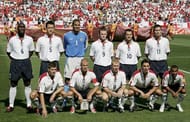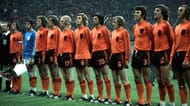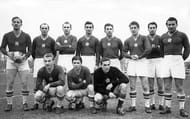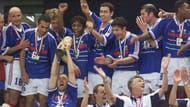We've seen football drastically change over time. Every generation has had extremely talented squads with legendary players, who have proved their worth by meeting the expectations of their fans.
However, some groups of players have gone on to exceed the expectations of their respective countries. While these squads all boasted of some of the best players in the world, they did not necessarily go on to win trophies on the international stage.
Irrespective of whether their abilities translated into trophies, these teams left an indelible mark on the history of football, and are known as 'golden generations'.
Here, we take a look at the top 5 golden generations in the history of football.
5. England – (2001-2008)

Football fans around the world know this England team to be the one that never lived up to their potential.
A team with the likes of David Beckham, Frank Lampard, Steven Gerrard, Michael Owen, Ashley Cole and Wayne Rooney was dubbed as England's 'golden generation' by the chief executive of the FA, Adam Crozier. But they turned out to be the perfect example of the quote "too many cooks spoil the broth".
At the club level, they had won more domestic honours than any other England team in history between them. Yet, they performed inconsistently in international competitions, despite some impressive victories.
With the help of a Beckham free-kick in injury time against Greece, England barely qualified for the 2002 World Cup, only to be knocked out by the legendary Brazil team of the early 21st century. Their lack of experience and the poor fitness levels of their star players cost England dearly.
Going into the 2004 Euro Cup, they were the favourites. In the quarter-finals, Wayne Rooney who was unplayable throughout the first half, but had to be substituted with a broken metatarsal. This turned out to be the turning point of the game. England drew 2–2 after extra-time but lost 6–5 on penalties, after dominating the whole match.
They then failed to qualify for the 2008 Euro Cup. They also had disappointing 2006 and 2010 World Cup campaigns, where they were eliminated in the quarter-finals and Round of 16 respectively.
Club rivalries, heightened expectations, and the lack of a manager who could handle a team with big stars and massive egos were the main reasons why this team could never live up to their potential.
Playing style:
They played in a flexible system, where they had strength in midfield and plenty of width. England played with two strikers up top, and the full-backs frequently had more time on the ball than midfielders. (Formation: 4-4-2)
4. Netherlands – (1974-1978)

The idea of total football was pioneered by Dutch club Ajax in the early 1970's. This style was spectacularly successful, with the club achieving home wins (46–0–0) for two full seasons (1971–72 and 1972–73), with just one defeat in the whole of the 1971–72 season.
The national side saw the introduction of total football in the 1974 World Cup, leading to huge success— 2 consecutive World Cup finals, the Euro semifinals, and several European Cups.
The Dutch side, as everybody expected, didn’t have many troubles on their way to the 1974 World Cup final, thrashing rivals like Argentina and Brazil. They were the best team in the tournament, and were the favourites to win the World Cup.
However, they were shockingly defeated 2-1 by West Germany in the final. This team had another chance to win the title in the next edition of football's biggest tournament, where Argentina defeated them 3-1.
The Netherlands are the World Cup's greatest underachievers. Apart from Johan Cryuff, they had a crop of amazing players like Piet Keizer, Willem van Hanegem, Johnny Rep, Ruud Krol, and Johan Neeskens, who fit together really well.
Yet, they could not win the World Cup despite playing in two finals. The players were very successful at the club level though, and most of them won domestic and continental cups.
Playing style:
The team took the revolutionary total football style of play from Ajax. The system was all about smart movement and flexible positions. (Formation: 4-3-3)
3. Hungary – (1950-1956)

The Hungary team of the 1950's were referred as the 'Golden Team' or the 'Magical Magyars'. Ferenc Puskás, László Kubala and Sándor Kocsis were magnificent football players, and had amazing club club careers with sides like Real Madrid and Barcelona. Other stars of that squad were Zoltán Czibor and Nándor Hidegkuti.
Between 1950 and 1956, the team played 50 matches, in which they recorded 42 victories and 7 draws. These 42 victories included beating Sweden 6-0, Italy 3-0, England 6-3 and 7-1, West Germany 8-3, South Korea 9-0, and many more famous results.
The only defeat came in the 1954 World Cup final against West Germany- the shock of the century, known as the 'Miracle of Bern'.
They are considered as one of the best teams to have never won the World Cup. The team is hugely credited for successfully implementing an early form of total football that was later used by the Netherlands in the 1970s.
This team won the Olympic Gold medal in 1952 Helsinki Games, where they beat Yugoslavia in the final. They also won the 1948–53 Central European International Cup, where 5 different teams participated.
Playing style:
The team developed a new style of play which included a revolutionary withdrawn centre-forward role, a sweeper-keeper, and fluid movement between positions for other players. (Formation: 3-2-3-2)
2. France – (1998-2006)

Unlike the Dutch and Hungarian sides which failed to turn quality into major trophies, France's golden generation had no such problems.
They had a group of players which included some of the world's most gifted footballers at the time, such as Zinedine Zidane, Thierry Henry, Laurent Blanc, Didier Deschamps, Eric Cantona, Patrick Vieira, Marcel Desailly, Robert Pires. They went on to win both the World Cup and the European Championship.
Their first success came on home soil as they defeated Brazil 3-0 in the World Cup final in 1998. The Brazil team had some of the world's best players like Ronaldo, Rivaldo, Cafu and Roberto Carlos, and they were the defending champions. A brace from Zinedine Zidane and a late goal from Petit announced France's arrival in world football.
Going into 2000 Euro Championship, they were the favourites and they did not disappoint. In the final, they came back from one goal down thanks a late goal by Wiltord in added time. France later went on to win the game 2-1 with help of a 103rd minute strike by Trezeguet.
They were favourites going into the 2002 World Cup as well, but they surprisingly could not progress further than the group stage.
After a shocking 2002 World Cup, France reached the World Cup final again in 2006. They lost to Italy on penalties, after Zidane was sent off for head-butting Italy's Marco Materazzi- one of the most historic moments the World Cup has ever seen.
Playing style:
Playing without wingers and with a target man- whose job was simply to hold the ball up- the attacking talent came from midfield. The innovation was the return of the two-tier midfield- a separation of attacking and defensive midfielders- that harked back to the W-M formation in some ways. (Formation: 4-3-2-1 / 4-2-3-1)
1. Spain – (2006-2012)

Spain's recent generation is one of the most successful groups of players at club and international level that the game has ever seen. While Spain had some decent teams over the years, they had always been international football's 'chokers', and had never assembled a squad that has consistently won trophies.
However, everything changed in the early 21st century. Spain's squad was full of Barcelona and Real Madrid players, including stars like Iker Casillas, Andres Iniesta, Xavi, Xabi Alonso, Carlos Puyol, Sergio Busquets, David Villa, Gerard Pique and Sergio Ramos.
Spain won the European Championship in 2008, their first victory in the competition for 44 years. They defeated Germany 1–0, thanks to a 33rd-minute goal by Fernando Torres in the final.
Spain dominated the World Cup qualifiers as they topped their group by winning all 10 games. They scored 28 goals and conceded just 5 goals. Going into the 2010 World Cup, Spain were the favourites despite having never progressed beyond the quarter-finals.
Their best performance was in 1950, when they finished 4th under a different format. They were a class apart, and despite aggressive tactics used by the Netherlands in the final, Spain won the World Cup beating them by 1-0 with the help of Andres Iniesta's goal in extra time.
They cemented their place as one of the greatest national teams ever at Euro 2012, after thrashing Italy 4-0 in the final to make it three consecutive major trophies.
This Spain team holds many world records, which further support their claim to be the greatest golden generation in football history. The records are as follows:
- Most consecutive wins including friendlies - 15 (2008-2009)
- Most consecutive competitive games undefeated - 29 (2010-2013)
- Highest maximum number of points in World Cup qualification - 30 out of 30 (2010)
Playing style:
Their style was famously known as 'tiki taka'. It was characterised by short passing and movement, working the ball through various channels, and maintaining possession. (Formation: 4-4-2 / 4-2-3-1)
